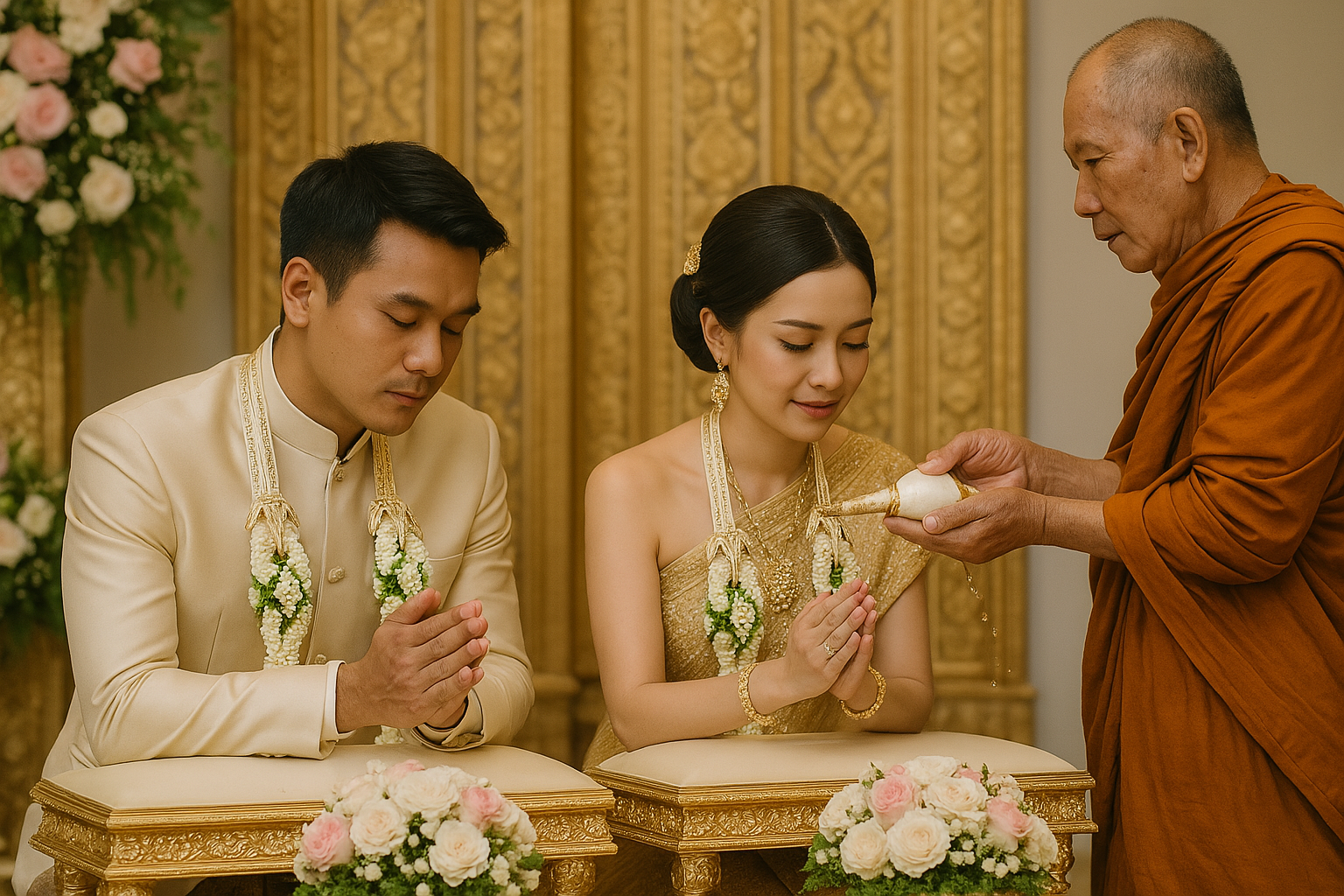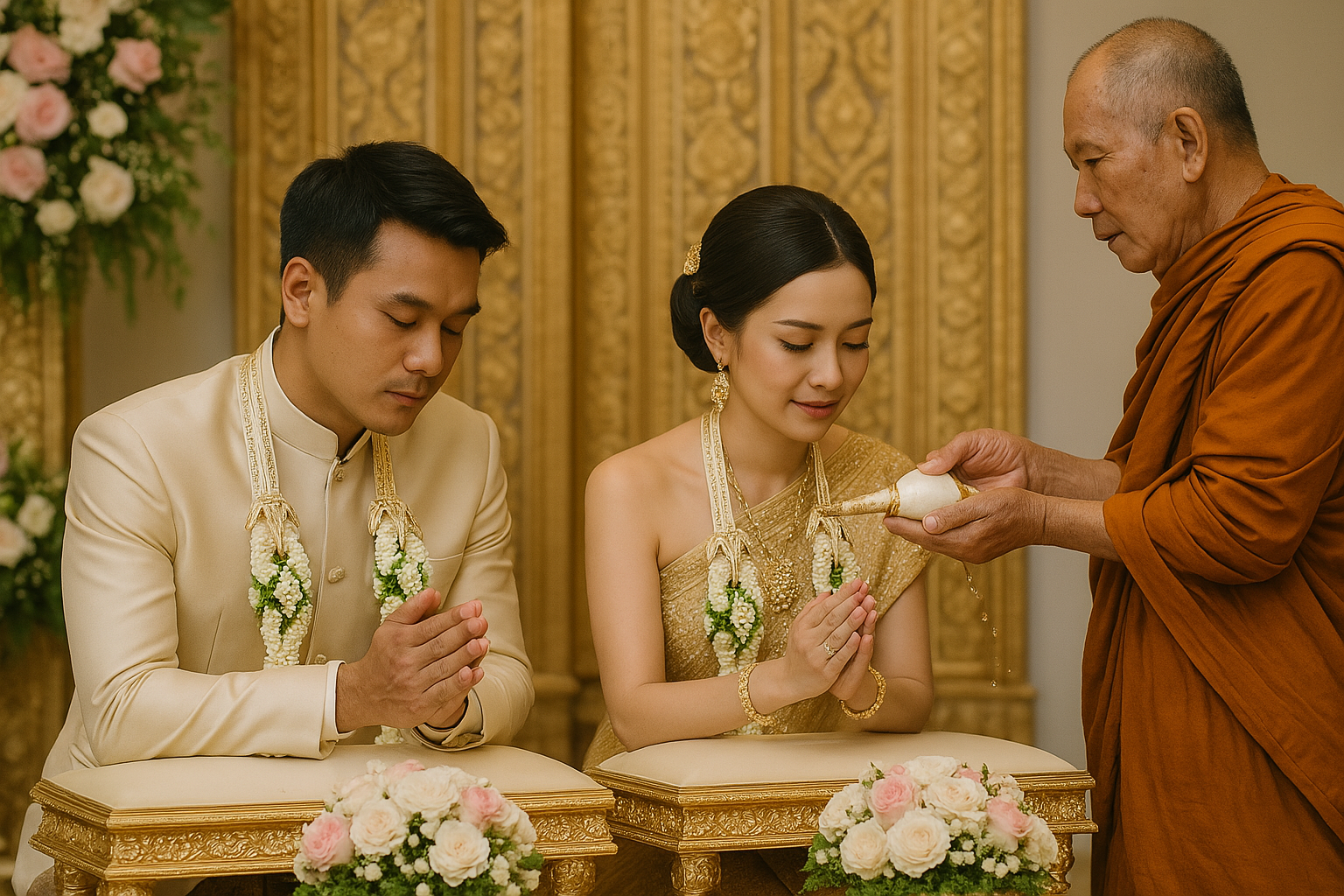
Marriage to a Thai woman combines beautiful cultural traditions with important legal considerations. This comprehensive guide will walk you through everything you need to know about marrying a Thai partner, from understanding cultural expectations to navigating the legal requirements.
Cultural Aspects of Thai Marriage
Thai marriages blend Buddhist traditions with unique cultural practices that have evolved over centuries:
Traditional Thai Wedding Ceremonies
A traditional Thai wedding typically includes several distinct ceremonies:
- Khan Maak Procession - The groom leads a procession to the bride's house, bringing gifts and symbolic items
- Rod Nam Sang - The water blessing ceremony, where guests pour water over the couple's hands while offering blessings
- Monk Blessing - Buddhist monks chant prayers and bless the couple
- String Ceremony (Phiti Bai Sri Su Kwan) - White strings are tied around the wrists of the couple to ensure good luck
The Sinsod (Dowry) Tradition
In Thai culture, the sinsod (sometimes called "bride price" in English) is an important element:
- The groom presents money and gifts to the bride's parents
- The amount is typically based on the bride's educational level, family status, and previous marital status
- Common sinsod amounts range from 100,000 to 1,000,000 THB ($3,000-$30,000 USD), though they can be higher
- In many modern Thai families, some or all of the sinsod may be returned to the couple after the ceremony
Family Involvement
Family plays a central role in Thai marriage considerations:
- Traditionally, the groom must request the bride's hand from her parents
- Family approval is highly valued in Thai culture
- Marriage is viewed as a union between families, not just individuals
- Both families typically participate actively in wedding planning
Looking for Your Thai Life Partner?
Create your profile on Thais.Love today and connect with Thai singles who are seeking meaningful relationships leading to marriage.
Join NowLegal Requirements for Marrying a Thai Woman
Marriage to a Thai national involves both Thai legal requirements and potentially those of your home country:
Basic Legal Requirements
To legally marry in Thailand, you'll need to meet these conditions:
- Both parties must be at least 17 years old (or obtain court permission if younger)
- Both must not be currently married to someone else
- The foreign partner must not have prohibited blood relations to the Thai partner
- The foreign partner must be mentally capable of understanding the marriage
- Both must enter into the marriage voluntarily
Documentation Needed
Foreign nationals will need to prepare several documents:
- Passport with valid visa status
- Affirmation of Freedom to Marry from your embassy or consulate in Thailand
- Divorce or Death Certificate (if previously married)
- Translated Documents - All non-Thai documents must be translated into Thai by a certified translator
- Thai ID Card or House Registration (Tabien Baan) of the Thai partner
The Registration Process
The legal registration of your marriage follows these steps:
- Obtain the Affirmation of Freedom to Marry from your embassy
- Have all foreign documents translated into Thai by a certified translator
- Register the marriage at any District Office (Amphur) in Thailand
- Both partners must be present with witnesses for the registration
- Once registered, you'll receive a Thai marriage certificate
- The marriage certificate should be translated into English if needed for use in your home country
Planning Your Wedding in Thailand
Many couples choose to have both a legal registration and a traditional ceremony:
Wedding Venues and Options
Thailand offers diverse wedding settings:
- Traditional Home Ceremony - Often held at the bride's family home
- Resort Weddings - Beachfront or luxury resort ceremonies are popular with international couples
- Buddhist Temple Weddings - Religious ceremonies held in temples for a spiritual experience
- Combined Western-Thai Ceremonies - Many couples blend elements from both cultures
Best Time for a Wedding in Thailand
Consider these factors when setting your wedding date:
- November to February offers the best weather (cool and dry season)
- Avoid the rainy season (June to October) for outdoor ceremonies
- Check Thai calendar for auspicious dates, which are important in Thai culture
- Be aware of Thai holidays and festivals that might affect venue availability
Working with Wedding Planners
Professional assistance can be invaluable:
- Many hotels and resorts offer wedding planning services
- Independent wedding planners specializing in Thai or cross-cultural weddings are available
- Costs typically range from 50,000 to 200,000 THB ($1,500-$6,000 USD) depending on services
- Planners can help navigate cultural traditions and communication with Thai vendors
Post-Marriage Considerations
After the wedding, several important matters need attention:
Visa and Immigration Issues
Marriage affects immigration status in various ways:
- Foreign spouses can apply for a Non-Immigrant O visa based on marriage
- After three years of marriage and living in Thailand, foreign spouses may apply for permanent residency
- Marriage does not automatically grant Thai citizenship, which has additional requirements
- Annual extensions of stay are required for marriage visas
Property and Financial Considerations
Be aware of these important legal aspects:
- Foreigners cannot legally own land in Thailand
- Alternative arrangements include company ownership, long-term leases, or having property in the Thai spouse's name
- Prenuptial agreements should be considered, especially for significant assets
- Joint bank accounts are possible but have specific regulations for foreign nationals
Cultural Adjustment
Long-term success requires mutual adaptation:
- Understanding family obligations, which may differ from Western expectations
- Learning basic Thai language to better communicate with in-laws and extended family
- Respecting religious practices and traditions important to your spouse
- Finding balanced approaches to different cultural perspectives on marriage roles
Common Challenges and How to Address Them
Cross-cultural marriages often face specific challenges:
Language and Communication
Bridging communication gaps:
- Learn at least basic Thai phrases to show respect and improve family communication
- Consider professional translation for important discussions with family members
- Be patient with miscommunications and verify understanding of important topics
- Develop non-verbal communication skills for situations where language is a barrier
Family Expectations
Managing cross-cultural family dynamics:
- Thai families may expect financial support or assistance from the couple
- Extended family involvement might be more intensive than in Western cultures
- Discussing expectations openly with your partner before marriage is crucial
- Establishing boundaries while maintaining respectful relationships
Cultural Differences in Marriage Roles
Finding harmony between different expectations:
- Traditional Thai marriages may have different gender role expectations
- Decision-making processes might differ between cultures
- Financial management and household responsibilities often reflect cultural backgrounds
- Successful cross-cultural marriages require flexibility and compromise from both partners
Conclusion
Marriage to a Thai woman offers a rich opportunity to blend cultural traditions and create a unique family dynamic. By understanding and respecting Thai marriage customs while fulfilling legal requirements, you can build a strong foundation for your cross-cultural relationship.
Remember that successful international marriages require patience, cultural sensitivity, and genuine respect for differences. With proper preparation and an open heart, your Thai-international marriage can be a beautiful journey of mutual growth and understanding.
Whether you choose a fully traditional Thai ceremony, a Western-style wedding, or a creative combination of both, your marriage will be strengthened by the effort you put into understanding and honoring each other's cultural heritage.
